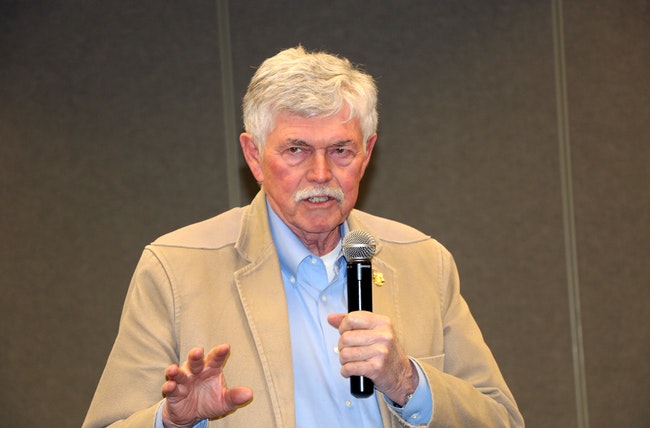
Ontario Mayor Riley Hill. (The Enterprise/File)
ONTARIO – A hearing transcript obtained through a public records request is shedding new light on Ontario mayor Riley Hill’s decision to sue the city over a $500 civil penalty.
Hill, a landlord and property developer, has been mayor of Ontario since 2019. The Jan. 11 suit, filed on behalf of Hill’s company Eldorado Investments Inc., asks that the city overturn a nuisance fee assessed for overgrown weeds and a derelict motor vehicle on a company lot, and that Hill’s legal fees be compensated.
New documents appear to show the mayor soliciting personalized help from the Ontario Police Department to clean the lot in question. They also reveal that the final fee assessed on the mayor, $500, was lowered from $3,500 at the direction of Police Chief Steven Romero.
The transcript includes testimony from Hill describing how he approached the Ontario Police Department for help ridding his property of squatters, apparently in 2019.
“I was concerned about that (the mess) because Oregon Housing Community Services were going to come out and inspect the area and I wanted it to look a little bit better,” said Hill in an appeals hearing Nov. 12. “So I approached then-Chief Kunz and (code enforcement) Officer Brockett about cleaning it up.”
According to Hill’s testimony, officers Kunz and Brockett “agreed to go help” and “said they would contact people on that street.”
To prepare for the cleanup, Hill said that he installed two large dumpsters and readied himself to foot the bill.
”That was just a little bit disheartening that I tried to clean it up, but it didn’t happen in the end,” said Hill. “It was more disheartening when the place is still a mess and then I get a ticket.”
Hill doesn’t describe the timing of the work, and he declined to clarify this and other points because of the open nature of the lawsuit.
Hill testified that he was issued an abatement notice on Jan. 23, 2020, that listed several violations of Ontario city code, including the presence of debris, outside storage of personal property, odors, and storage of a motor vehicle. Hill was given until Feb. 6, to clean up – without the city’s aid.
However, Romero and Brockett, who is now working as a code enforcement officer for Baker City, told the Enterprise that it would be unusual for police to help clean up private property.
“That has not been the norm since I’ve been here,” said Romero, who joined the department as chief in June 2019. “I’ve not seen any consistent requests like that where people are approaching the police department to clean up their properties.”
Romero said that he was aware of some scenarios in which Ontario police officers had helped citizens in fragile health to clear code violations, but said that they had done so strictly at their own discretion, on a volunteer basis.
Brockett specified that he didn’t think Hill had ever explicitly asked the city for help cleaning up his property. In fact, when Hill asked Brockett for help with evicting the squatters, he did so without clarifying that the property in question belonged to him.
“While filling out the initial abatement letter, and researching Malheur County assessors on the property owner, is when I found out the property he mentioned was his own,” said Brockett in an email.
In his appeal, Hill submitted receipts dated Aug. 11 that show he again installed dumpsters on his property for seven days before receiving the civil penalty for the presence of weeds and an abandoned vehicle on Aug. 22. Those dumpsters cost Hill about $300. The letter didn’t specify whether Hill retained any particular service to clean up and fill the dumpsters.
Around the time that Brockett filed the abatement, he made contact with the person living in a tent on Hill’s property who was “essentially defecating in the backyard,” who he advised to abandon the property. He testified during the hearing that he also made contact with the squatters who were living inside a mobile home on the property. Brockett said they had been living there for so long that he could not cite them for trespassing; rather, they would need to be formally evicted, a process traditionally handled by the landlord.
City records show that Hill made an effort to evict the squatters in February, but he testified that he was unsuccessful in actually doing so until “June or July.”
Hearings officer Billy Carter stated that “I did see where the judge, I think on February the 20th, basically gave the authorization to go in and get the property cleaned up. So, you could have got deputies and went in and physically removed the people and cleaned the property up at that time. That was back in February, based on the information that I received. So, I think it’s just unbelievable that we’re actually in this hearing after all of this time.”
Carter established that Hill owed the city of Ontario $500 in nuisance fees, a $100 reduction from the $600 originally assessed because credit was given to Hill for “some progress” he’d made in cleaning up the property.
But it wasn’t the first time a city official had decided to waive part of Hill’s nuisance fees.
During the appeals hearing, Brockett shared that “Between July 22 and Aug. 19, I initially filled out a daily penalty because of the length of the property being out of compliance. So that would have been almost seven months. We usually don’t let a case be open that long but considering the circumstance and (that new code enforcement) Officer Reyna came on board in January, right in that time, I was busy training him, so my chief (Romero) directed me not to do a daily penalty and just do the one time for the $600.”
Romero told the Enterprise that by lowering the fine, he hoped to make Reyna and Brockett’s work run more smoothly.
“The more open cases that exist, the more work is created for code enforcement,” he said, noting that the mayor’s decision to litigate rather than closing the case had taken him by surprise. “(Each case) costs money and takes time and that takes away from their ability to respond to other community needs.”
According to Romero, code enforcement officers have significant discretion over how to levy fines for noncompliance.
“They’re given discretion under what they observe on that property, the conditions, what steps the property owner takes to remedy it, and time (spent on the case),” said Romero.
It is also “best practice” for ordinary officers with supervisors for cases involving elected officials, Romero said.
“(Brockett and Reyna) found themselves in an awkward position because the current mayor was the subject of the civil investigation,” said Romero. “When staff has that type of dilemma, that type of vicarious liability should always sit with the agency head, not with the low-level employees.”
News tip? Contact reporter Liliana Frankel at [email protected] or 267-981-5577.
YOU CAN SUPPORT THIS KIND OF WORK
The Enterprise relies on community support to fund vital local journalism. You can help us do more.
SUBSCRIBE: A monthly digital subscription is $5 a month.
GIFT: Give someone you know a subscription.
ONE-TIME PAYMENT: Contribute, knowing your support goes towards more local journalism you can trust.




